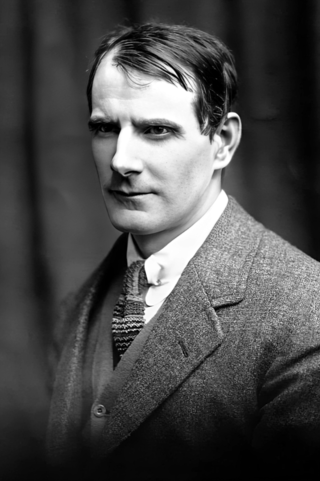| |||||
| Centuries: | |||||
|---|---|---|---|---|---|
| Decades: | |||||
| See also: | Other events of 1713 List of years in Ireland | ||||
Events from the year 1713 in Ireland.
| |||||
| Centuries: | |||||
|---|---|---|---|---|---|
| Decades: | |||||
| See also: | Other events of 1713 List of years in Ireland | ||||
Events from the year 1713 in Ireland.

Laurence Sterne was an Anglo-Irish novelist and Anglican cleric who wrote the novels The Life and Opinions of Tristram Shandy, Gentleman and A Sentimental Journey Through France and Italy, published sermons and memoirs, and indulged in local politics. He grew up in a military family, travelling mainly in Ireland but briefly in England. An uncle paid for Sterne to attend Hipperholme Grammar School in the West Riding of Yorkshire, as Sterne's father was ordered to Jamaica, where he died of malaria some years later. He attended Jesus College, Cambridge on a sizarship, gaining bachelor's and master's degrees. While Vicar of Sutton-on-the-Forest, Yorkshire, he married Elizabeth Lumley in 1741. His ecclesiastical satire A Political Romance infuriated the church and was burnt.

The Life and Opinions of Tristram Shandy, Gentleman, also known as Tristram Shandy, is a novel by Laurence Sterne. It was published in nine volumes, the first two appearing in 1759, and seven others following over the next seven years. It purports to be a biography of the eponymous character. Its style is marked by digression, double entendre, and graphic devices. The first edition was printed by Ann Ward on Coney Street, York.

Seán O'Casey was an Irish dramatist and memoirist. A committed socialist, he was the first Irish playwright of note to write about the Dublin working classes.

Joe Cahill was a prominent figure in the Irish republican movement in Northern Ireland and former chief of staff of the Provisional Irish Republican Army (IRA). He joined a junior-republican movement, Na Fianna Eireann, in 1937 and the following year, joined the Irish Republican Army. In 1969, Cahill was a key figure in the founding of the Provisional Irish Republican Army. During his time in the Provisional IRA, Cahill helped import weapons and raise financial support. He served as the chief of staff in 1972, but was arrested the following year when a ship importing weapons was intercepted.

Allen Bathurst, 1st Earl Bathurst,, of Bathurst in the County of Sussex, known as The Lord Bathurst from 1712 to 1772, was a British Tory politician. Bathurst sat in the English and British House of Commons from 1705 until 1712 and then in the British House of Lords until his death in 1775, after being raised to the peerage as Baron Bathurst.

Norah Allison McGuinness was an Irish painter and illustrator.
John Forster was an Irish lawyer, politician and judge.
Events from the year 1886 in Ireland.
Events from the year 1768 in Great Britain.

James Laurence Carew was an Irish nationalist politician and Member of Parliament (MP) in the House of Commons of the United Kingdom. A member of the Irish Parliamentary Party and later a Parnellite, he was MP for North Kildare from 1885 to 1892, for Dublin College Green from 1896–1900, and for South Meath from 1900 until he died in 1903.
Events from the year 1857 in Ireland.
Events from the year 1768 in Ireland.

Laurence O'Neill was an Irish politician and corn merchant who served as Lord Mayor of Dublin from 1917 to 1924, serving through the Irish War of Independence and the Irish Civil War. He refused an offer to act as Crown Prosecutor after the Easter Rising. During the 1920 Irish hunger strikes, O'Neill actively supported the demands of the 36 hunger strikers in Mountjoy Prison.
Lancelot (Launcelot) Bulkeley was a Welsh Archbishop of Dublin and member of the Privy Council of Ireland.
Jemmett Browne was the Church of Ireland Bishop of Killaloe from 1743 to 1745, Bishop of Dromore for three months in the middle of 1745, Bishop of Cork and Ross from 1745 to 1772, Bishop of Elphin from 1772 to 1775, and finally Archbishop of Tuam from 1775 until his death in 1782.
Ven. Henry Cotton was an English Anglican divine, ecclesiastical historian and author.

Aodhán Ó Ríordáin is an Irish Labour Party politician who has been a Member of the European Parliament (MEP) from Ireland for the Dublin constituency since July 2024. He previously served as a Teachta Dála (TD) for the Dublin Bay North constituency from the 2020 general election to 2024, and from 2011 to 2016 for the Dublin North-Central constituency. He served as a Minister of State from 2014 to 2016. He was a Senator for the Industrial and Commercial Panel from 2016 to 2020.

John Stearne or Sterne (1624–1669) was an Irish academic, founder of the Irish College of Physicians.

John Sterne (1660–1745) was an Irish Church of Ireland clergyman, bishop of Dromore from 1713 and then bishop of Clogher from 1717.

Sir John Esmonde, 10th Baronet was an Irish nationalist politician. He sat in the House of Commons of the United Kingdom from 1852 until his death 25 years later.